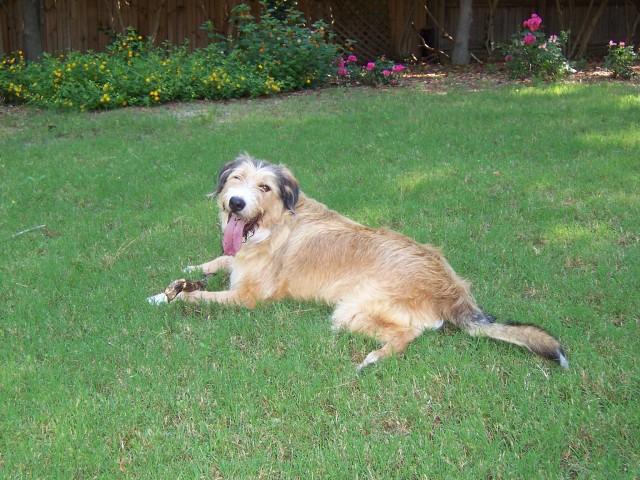QuestionHello Dr. Connor,
We have a schipper-chow (size is schipperkey, just a bit bigger, with some behavioral chow traits at times and a black tongue) mix who is about 11-12 years old (she was a street dog when we got her at about 2?). She has always had her shots, is on heart-worm medicine, and had been spayed by the time we got her. Over the past couple of months her behavior has gotten very odd. She will wake us up multiple times by walking on our heads, faces, and generally acting very needy. This is usually accompanied by shaking, heavy breathing, and a want to get out (through our bedroom window). Her daytime behavior has started to change as well, with her becoming very assertive of her presence, often underfoot, and the behavior during these times is unique from old behaviors. She has plenty of water, good exercise, and is well feed (a bit overweight at that). I don't really know where to go from here, I don't believe there is an underlying physical issue, thinking she is just starting to go a bit daft. We are in New Orleans and veterinary care can be a bit tough, options are very low, and cost are quite high, though we will take whatever measures needed. I am hoping you can add some insight to this and if you do feel this is an issue I need to take up with my vet that you can give me some talking points. Thank you!
AnswerThis might be a cognitive dysfunction issue. It could be senility or it could be a sign (given sudden onset) of a neurological insult of some sort. It's not easy to diagnose this sort of thing, requiring a veterinarian knowledgeable in neurological function and diagnosis, and though some expensive tests could be done, a simple neurological examination might be sufficient. This involves holding up each foot and observing balance, examination of the eye, observation of dog's posture when walking, sitting, etc., combined with your observations. But, again, it needs the attention of a veterinarian who is competent to assess neurological problems (not all are, just as human physicians often cannot determine specialized problems in their patients.) The night time behavior might also suggest she is suffering from as simple a problem as cataracts. Although bright light worsens the effect of cataracts, night time vision is equally impaired and dogs suffer from this impairment, as their night time vision is usually very acute. It's obvious she's afraid at night and is equally insecure during the day. This isn't simply behavioral.
The only really significant behavior that might occur with cognitive problems is aggression. If your dog is not demonstrating aggression, make her as comfortable as possible. If you can't find a veterinarian whose skill you trust, take her to her regular veterinarian and report the problems you are seeing. The veterinarian might dismiss any physical cause, but I'm almost certain that's what you're seeing. The veterinarian should be able to easily see cataracts; if that's definitely ruled out, you might want to try a nutritional and holistic approach to calm your dog's night time terrors and help support her as she approaches the end of her life. We have an expert here, Shelly Davis, who knows quite a lot about holistic and nutritional support. Go to the vet FIRST, then ask Shelly what you can do to make your aging dog's life a bit easier. Be certain to look up any OTC meds, herbs, etc., as well as anything the veterinarian might prescribe, for side effects, behavioral and physical.

 My Shiba Inu
Question
Lola
I bought a registered Shiba Inu puppy fro
My Shiba Inu
Question
Lola
I bought a registered Shiba Inu puppy fro
 dogs behaviour
QuestionMy 8 months old Dusto
QUESTION: My puppy
dogs behaviour
QuestionMy 8 months old Dusto
QUESTION: My puppy
 Is this aggression, dominance, or play?
QuestionQUESTION: I have a question regarding doggy beh
Is this aggression, dominance, or play?
QuestionQUESTION: I have a question regarding doggy beh
 Very Scared Dog
Question
Happy
My dog is 17 months old and is a mixed b
Very Scared Dog
Question
Happy
My dog is 17 months old and is a mixed b
 anxious dog
Question
Louie
Hi, We adopted a 2 year old male A
anxious dog
Question
Louie
Hi, We adopted a 2 year old male A